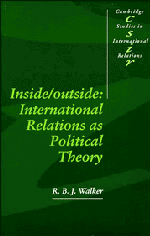Book contents
- Frontmatter
- Contents
- Preface
- 1 International relations as political theory
- 2 The Prince and ‘the pauper’
- 3 Ethics, modernity, community
- 4 History, structure, reification
- 5 Realism and change
- 6 The territorial state and the theme of Gulliver
- 7 On the spatio-temporal conditions of democratic practice
- 8 Sovereign identities and the politics of forgetting
- Notes
- Bibliography
- Index
7 - On the spatio-temporal conditions of democratic practice
Published online by Cambridge University Press: 05 July 2011
- Frontmatter
- Contents
- Preface
- 1 International relations as political theory
- 2 The Prince and ‘the pauper’
- 3 Ethics, modernity, community
- 4 History, structure, reification
- 5 Realism and change
- 6 The territorial state and the theme of Gulliver
- 7 On the spatio-temporal conditions of democratic practice
- 8 Sovereign identities and the politics of forgetting
- Notes
- Bibliography
- Index
Summary
Cosmopolitan charm and cultivated cynicism
‘We are all democrats today’, wrote John Dunn in his wide-ranging interrogation of the limits of ‘Western political theory in the face of the future’. And beginning the interrogation with the claims of democratic theory, he immediately reminded us of the broadly acknowledged double role of democracy as both a rhetoric of great ‘cosmopolitan charm’ and a practice that is, to Dunn's sceptical eye, ‘pretty thin on the ground’.
Democratic theory is the moral Esperanto of the present nation-state system, the language in which all Nations are truly United, the public cant of the modern world, a dubious currency indeed – and one which only a complete imbecile would be likely to take quite at face value, quite literally.
Just over a decade into the future horizons that Dunn was trying to scan in the rearview mirror, democratic practices came to seem rather more prolific. Democratic achievements were celebrated in many places over that past decade, but the linking of democracy with the shattering of rigidities crystallised at Yalta seemed especially exhilarating. Entrenched geopolitical platitudes and the rhetoric of infidels began to shrivel – or at least to be redirected – before that most fundamental of all political insights: things change. Amidst the swirling events of contemporary European politics especially, the cosmopolitan charm of democracy became more seductive than ever.
- Type
- Chapter
- Information
- Inside/OutsideInternational Relations as Political Theory, pp. 141 - 158Publisher: Cambridge University PressPrint publication year: 1992
- 1
- Cited by

